Do you have an interest in Linux or want to learn more about it? So, in this Linux Foundation training Review, I will discuss my experience with Linux Foundation Training and how it helped me to become a Linux Expert from just using a graphical interface for operations to the command line for coding.
The problem with the Linux operating system is that it is difficult to grasp, difficult to keep up with, and the material is complex and may just go over your head. Therefore, you might need a Linux course to help you learn everything about the Linux foundation and the concepts of how to work with Linux.
The Linux Foundation courses are meant to enable people with basic IT knowledge to get familiar with Linux. The goal of Linux Foundation Training is to promote, standardize, and support the Linux community.
To summarise, The points we discuss in our Linux Foundation Training Review:
- What exactly is the Linux Foundation?
- Which Linux Foundation courses and Certificates are Offered?
- Details about each linux Foundation Course, as well as which one is ideal for you i.e. cloud engineer and bootcamp Promgrams available on Course.
- How these certifications can help you in your career.
- What are Linux Foundation Career Opportunities?
- Also included are features, Pros & Cons, and cost (paid and free courses) of the Linux Foundation Training.
So, in this review, I’ll go over all you need to know about Linux Foundation Training and Linux Foundation Kubernetes Training And Certifications, and a lot more.
The Linux Foundation isn’t simply some organization that sits around and twiddles its bash shell all day. To fulfill their purpose of community building, they provide Linux classes as well as various sorts of Linux and Linux-related training. The training was well-planned and simple to follow. The option to start and stop was really useful. The amount of time given between halted studies was quite beneficial.
Linux Foundation Training will help you gain a good working knowledge of Linux and teach you how to navigate major Linux distributions, system configurations, and the graphical interface of Linux, as well as basic command-line operations. It will also increase your capacity to work smoothly in a Linux environment. Over millions of open source, professionals have registered in Linux Foundation Training courses and have been certified by the experts who are producing the world’s most significant open-source projects.
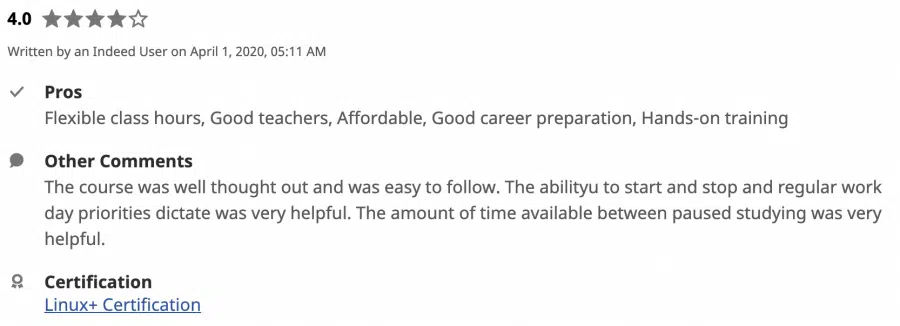
TLDR: The Linux Foundation Training Review In 2022: How Can I Get Free Linux Foundation Courses?
- The Linux Foundation is the world’s largest non-profit technology consortium that carries out initiatives in many open source technologies, Courses, Certifications, software, Kubernetes Training, Kubernetes Certification, Cloud engineer blockchain, etc
- The Linux Foundation is providing courses and certifications in many domains of technology like cloud computing, open-source software, and other Linux and Linux adjacent technologies for those who want to upskill themselves in these domains.
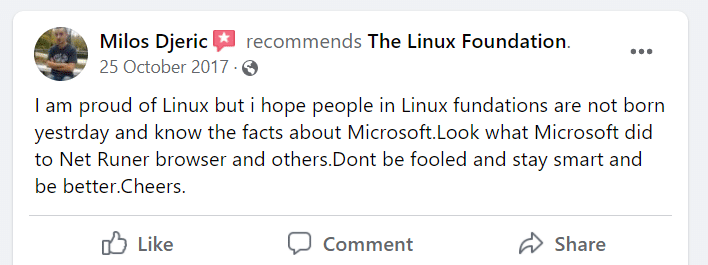
- If you are interested in these courses and increase your brand value you can get access to any one of the courses at a 30% discount by using Linux Foundation Coupon Code linux30
- Most of the courses provided by the Linux foundation are pre-recorded lessons however some courses contain live training sessions, workshops, etc. Linux Foundation provides both free and paid certifications.
Linux Foundation Certification Coupon Code 2022 Linux Foundation Training Discount Upto 30% Off

Well, we have some good news for all the Linux enthusiasts who are very keen on learning these amazing courses provided by Linux Foundation Training. On the occasion of the Linux Foundation’s 30th anniversary, Linux Foundation is providing a 30% discount on any course you want to get enrolled in, Use linux foundation coupon Now
You can use Coupon code LINUX30 to get a discount on any one course of your choice.
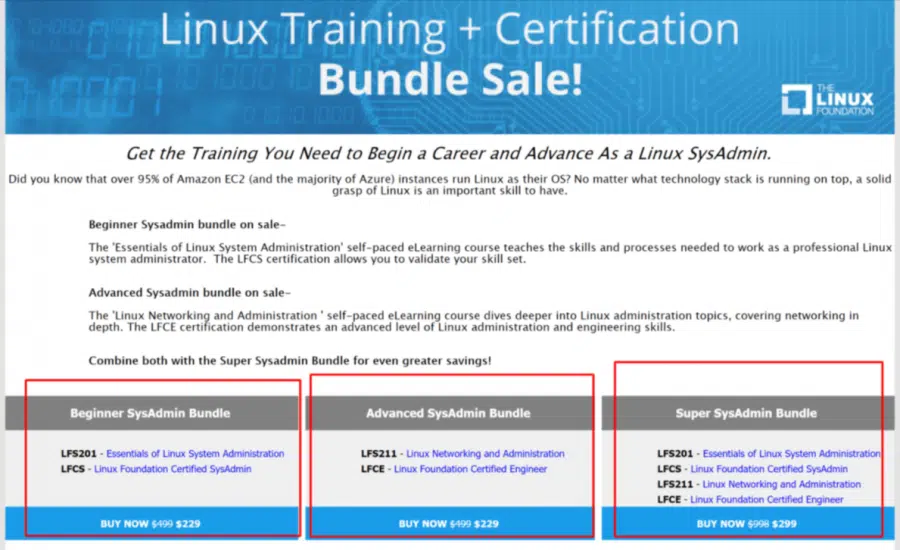
So, go ahead and use this Golden Opportunity to learn and increase your skillset and get ready for the future!
In conclusion, the Linux Foundation arguably holds the weightage of being the best in offering courses. With the help of Linux Foundation Training, you can make your add uncountable skills with excellence in all certs but, the Linux Academy comes with zero oversight as they focus on courses only.
Linux Foundation Training Review: Pros & Cons
Pros
- Linux Foundation is one of the world’s largest technology organisations which is working towards making technology accessible for everyone
- The projects undertaken by Linux are in every area of technology ranging from web development to Blockchain.
- The courses provided by Linux enjoys good industry recognition
- Linux Foundation Training has a large repository of up to date courses from a wide variety of subjects
- The job opportunities post completing the reputed certification by Linux Foundation are immense and salary expectations are also good
- Once you complete the course by Linux, you become a part of a global community of Linux professional
- Linux provides you extra support in the form of good industry connections, workshops, live training sessions, events, etc.
- As Linux systems are used across the world you can explore job opportunities in all the countries where you want to work
- Linux Foundation provides many free courses that can help you gain basic knowledge about new and latest technologies like cloud computing, blockchain, etc.
- Linux Foundation keeps on updating its courses and constantly adds new courses as well.
Cons
- Linux is not an academic organisation hence, you don’t get any continuation of education credits
- The core focus of Linux Foundation courses is on Linux systems and environment, hence, you miss out on learning of different systems used
- The free courses are not in-depth and provide only basic knowledge about the subject
A Brief History About Linux Foundation: Which Certification Is Best For Linux?
Linux Kernel, an open-source operating system was first released on 17th September 1991 by Linus Torvalds and his community of developers, and that marked the beginning of Linux.
Today Linux Foundation sponsors the work of Linux’ creator: Linus Torvalds and Linux’ lead maintainer Greg Kroah-Hartman.
Other key people related to the growth and expansion of the Linux Foundation include Brian Behlendorf, Dan Kohn, Jim Zemlin, Abby Kearns, Arpi Joshipura, and many others.
In recent years Linux foundation has expanded its programs by conducting events, providing training and certification programs, and other Open-source programs.
Some of the projects being conducted by the Linux Foundation include the Linux Kernel project, Kubernetes Project, Automotive grade Linux, Open Network Automation Platform (ONAP), Hyperledger, Cloud-Native Computing Foundation, Cloud Foundry Foundation, Xen project, and many others.
Over the past 3 decades, Linux has become a technology giant and has remained a Not for profit organization and is working hard towards the Democratization of technology and making it accessible to everyone while building a global community.
Linux Foundation is supported by leading organizations like AT&T, Google, Fujitsu, Huawei, Hitachi, Oracle, Intel, Qualcomm, Samsung, Tencent, VMWare, and many other developers from across the world.
What Is The Linux Foundation?
Linux Foundation is a non-profit technology consortium founded in the year 2000. As a merger between Open source Development labs and free standards group. Linux supports, hosts, and promotes open-source software projects.
Linux Foundation carries out many initiatives in the field of software, climate finance, open-source technologies, etc. and amongst its many initiatives, it provides training and certification on various topics and software. In March 2014, Linux partnered with EdX to provide Massive Online Open Class (MOOCs).
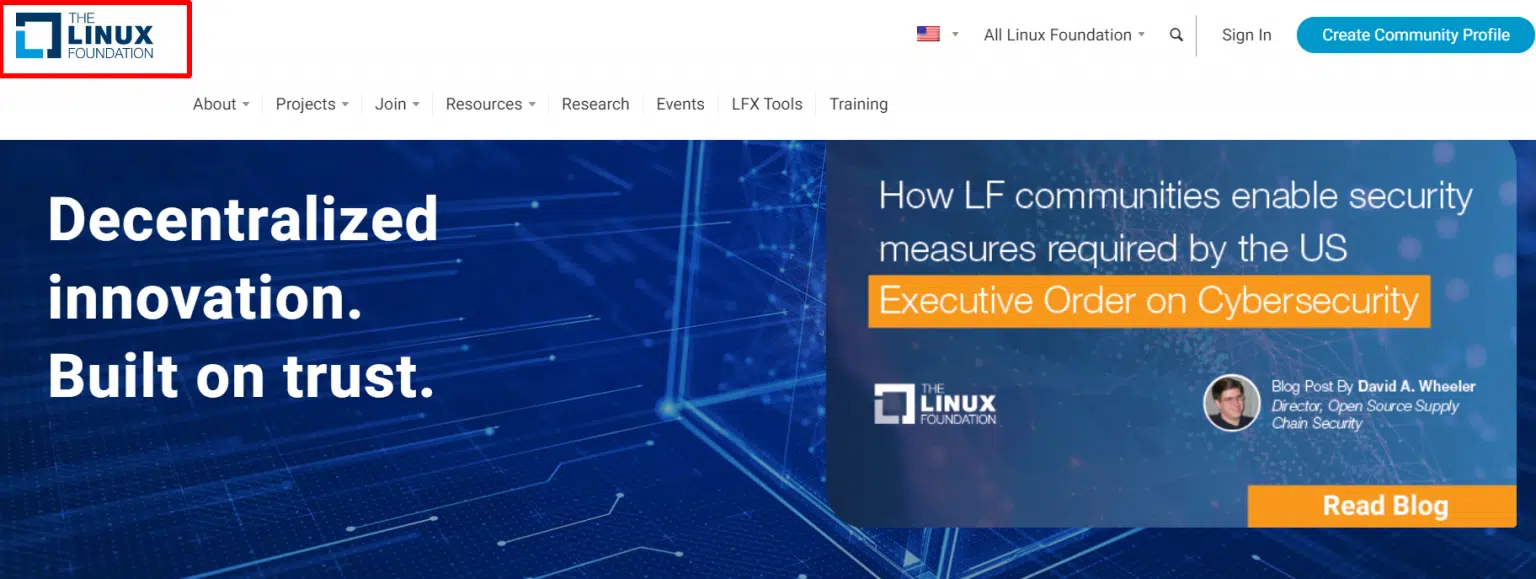
The first course started by Linux was Introduction to Linux which was later on followed by many other courses related to DevOps, Cloud Foundry and Cloud-Native Software Architecture, Apache Hadoop, Cloud Infrastructure Technologies, and OpenStack. Throughout these years Linux has been at the forefront to democratize the technology space.
Here is the Linux Foundation Course review. I would review a few free and paid Linux Foundation Courses which can help you to explore more.
Linux Foundation Training Review: Linux Foundation Kubernetes Training And Certifications
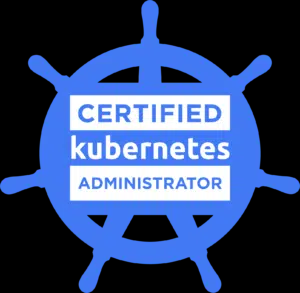
Kubernetes is an open-source Container-Orchestration system that helps to automate computer application deployment, management, and scaling.
Kubernetes was originally developed by Google; however, it is now maintained by Linux’s Cloud Native Computing Foundation.
Because of its broad uses and application, there has been a huge demand for Kubernetes experts and professionals and Linux Kubernetes Training Programs are the best place to learn Kubernetes in-depth and gain hands-on training as well. Let us see some of the best Kubernetes certifications offered by Linux Foundation Training.
Certified Kubernetes Administrator (CKA)
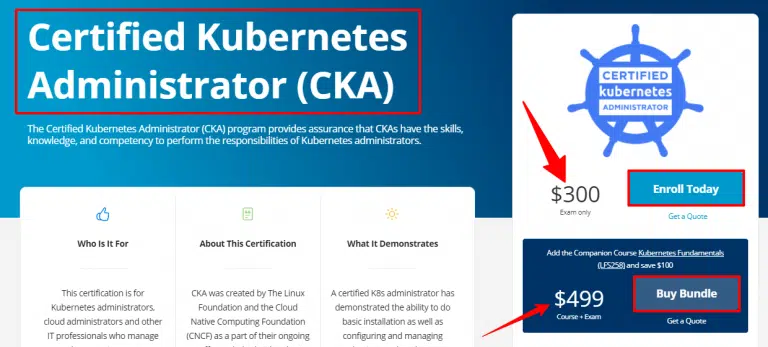
This Certification by Linux Foundation on Kubernetes is a gold-standard certification that can make you a complete Kubernetes Administrator and take your career to new heights.
The cost of this certification is $499 that includes the course as well as the exam however if you just want to appear for the exam and get certified, this certification can cost $300.
Certified Kubernetes Administrator is suitable for people who aspire to be Kubernetes professionals, administrators, Cloud administrators. This certification can also benefit other IT professionals as well as fresh IT graduates.
With this certification in Kubernetes, you will be able to install, configure and manage production-grade Kubernetes clusters.
You will also have an in-depth understanding of key Kubernetes concepts such as Kubernetes networking, storage, security, maintenance, logging and monitoring, application lifecycle, troubleshooting, API object primitives, and lastly the ability to establish basic use-case for end users.
Kubernetes Fundamentals (LFS258)
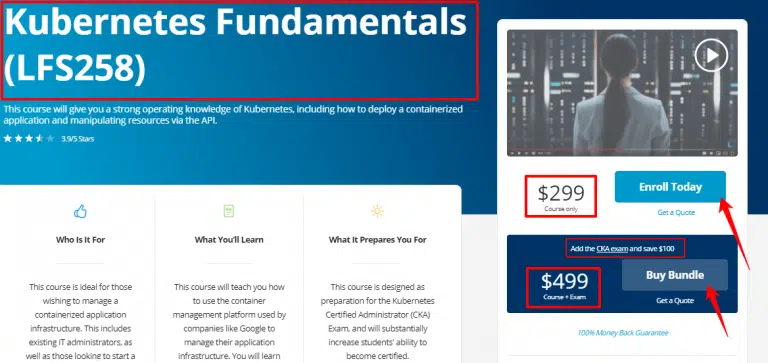
You can buy Kubernetes Fundamentals for $299 and if you want to appear for the exam and get certified, you need to pay $499
The course is ideal for those professionals or students. Who wish to manage containerized application infrastructure.
The course will teach you how to manage and use the container management platform used by leading companies like Google to manage their application infrastructure. The course also touches upon key principles such as pods, deployments, replica sets, and services.
Kubernetes For Developers (LFD259)
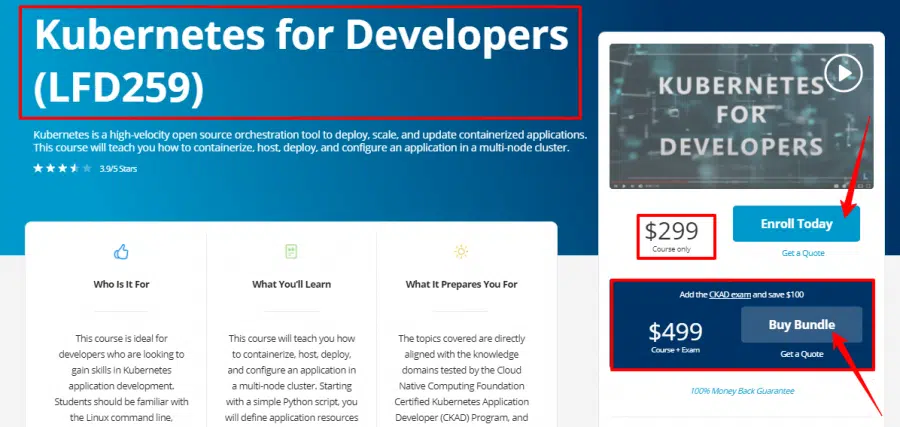
You can do Kubernetes for Developers certification for $299 and if you want to appear for the exam and get certified, you need to pay $499
The course is ideal for developers who wish to gain in-depth skills and knowledge in Kubernetes application development. Before beginning the course, the student should be familiar with the Linux command line, Python, Node.js or Go.
The course will teach you to containerize, host, deploy and configure an application in a multi-node cluster. After the completion of the course, you will be able to define application resources and use core primitives to build, monitor and troubleshoot scalable applications in Kubernetes.
This program will help you to create strong application knowledge in Kubernetes and prepare you for advanced Kubernetes certifications like Cloud Native Computing Foundation Certified Kubernetes Application Developer (CKAD).
Kubernetes Security Essentials (LFS260)
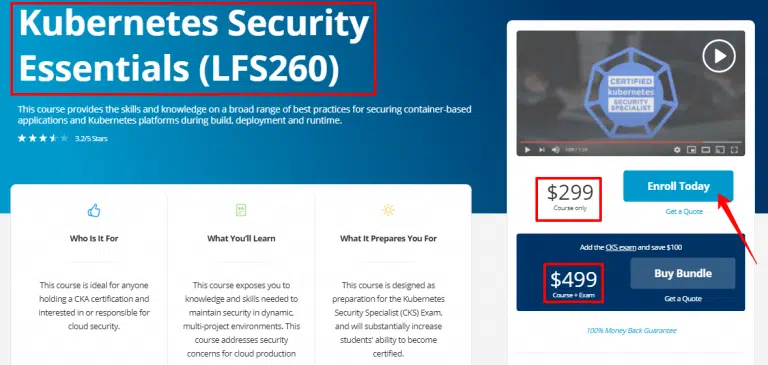
Kubernetes Security Essentials is quite an advanced course offered by Linux Foundation Training. This course is ideal for anyone who already has CKA Certification and is looking forward to advancing his/her skillset in cloud security mechanisms.
You can do Kubernetes Security Essentials for $299 and if you want to appear for the exam and get certified, you need to pay $499.
The course trains you to maintain security in dynamic, multi-project environments. This course specifically addresses security concerns for cloud production environments and covers topics related to the security container supply chain. The course includes hands-on labs to build and secure a Kubernetes cluster and monitor and log security events.
This course is the base for the Kubernetes Security Specialist (CKS) Certification exam.
Certified Kubernetes Application Developer (CKAD)
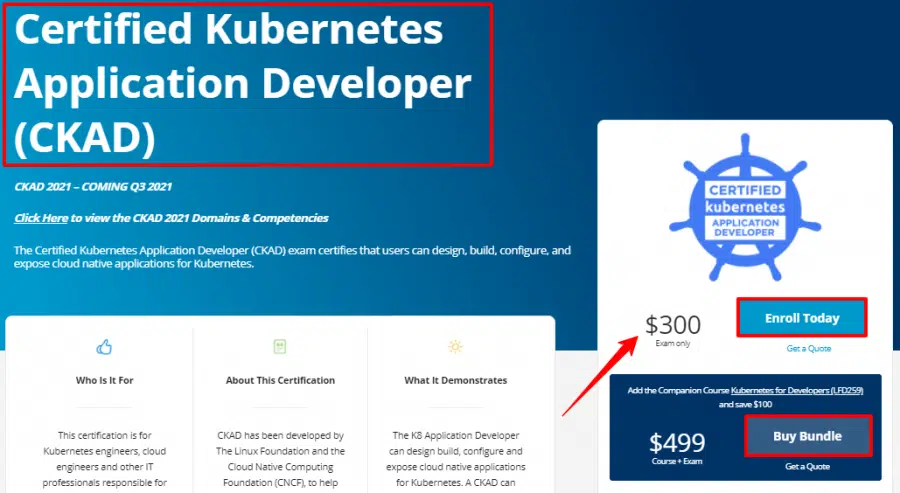
The certification in Kubernetes Developer is ideal for Kubernetes Engineers, cloud engineers, IT professionals, and all those professionals who are responsible for building, deploying, and configuring cloud-native applications with Kubernetes.
CKAD certification is made to provide standardized training and certification across all the Kubernetes Developers. The certification will equip you with the necessary Kubernetes skillset to design-build, configure and expose cloud-native applications for Kubernetes.
The certification can cost $499 that includes the exam plus course however if you just want to appear for the exam to get certified, it can cost you $300.
Certified Kubernetes Security Specialist (CKS)
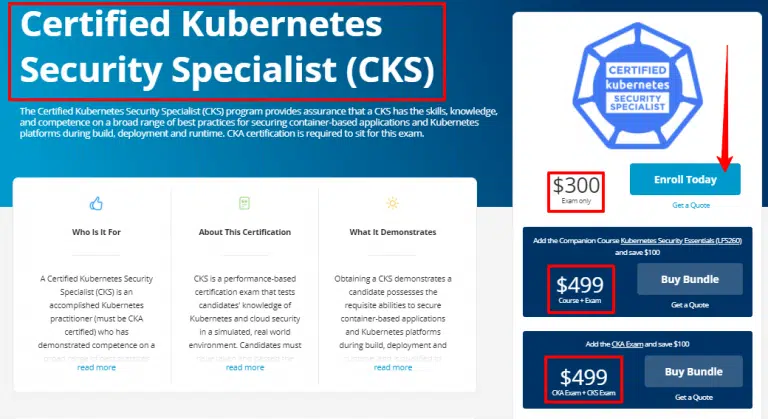
You can get Certified for Kubernetes Security Specialist for $499 that includes course as well as certification however if you just want to appear for the exam and get CKS certified, you just need to pay $300
This certification in Kubernetes Security is an ideal certification for accomplished Kubernetes practitioners (must be CKA certified).
The CKS exam tests the candidates’ ability and knowledge of Kubernetes and cloud security in a simulated, real-world environment. Having CKS certification is proof that the candidate possesses the required abilities to secure container-based applications and Kubernetes platforms.
Linux Foundation Training Review: Free Courses Available On Linux Foundation
Here are a few Free Linux Foundation Course Reviews to help you make the best decision for yourself.
Introduction To Kubernetes (LFS158x)
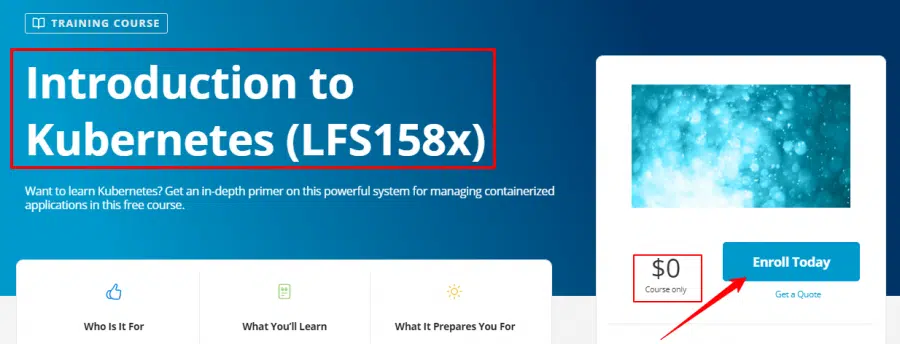
The course on Introduction to Kubernetes is an ideal course for the candidates looking forward. To beginning with Kubernetes and want to explore careers in the Kubernetes domain and related technologies.
The course is available for free on Linux Foundation Training. However you need to pay to get certification after completing the course.
The course will give you an overview of Kubernetes and teach. You about the origin, architecture, primary components, and building blocks of Kubernetes. This course will form a beginning strong base for you to pursue higher-level Kubernetes certification and get specialized.
Fundamentals Of Professional Open Source Management:
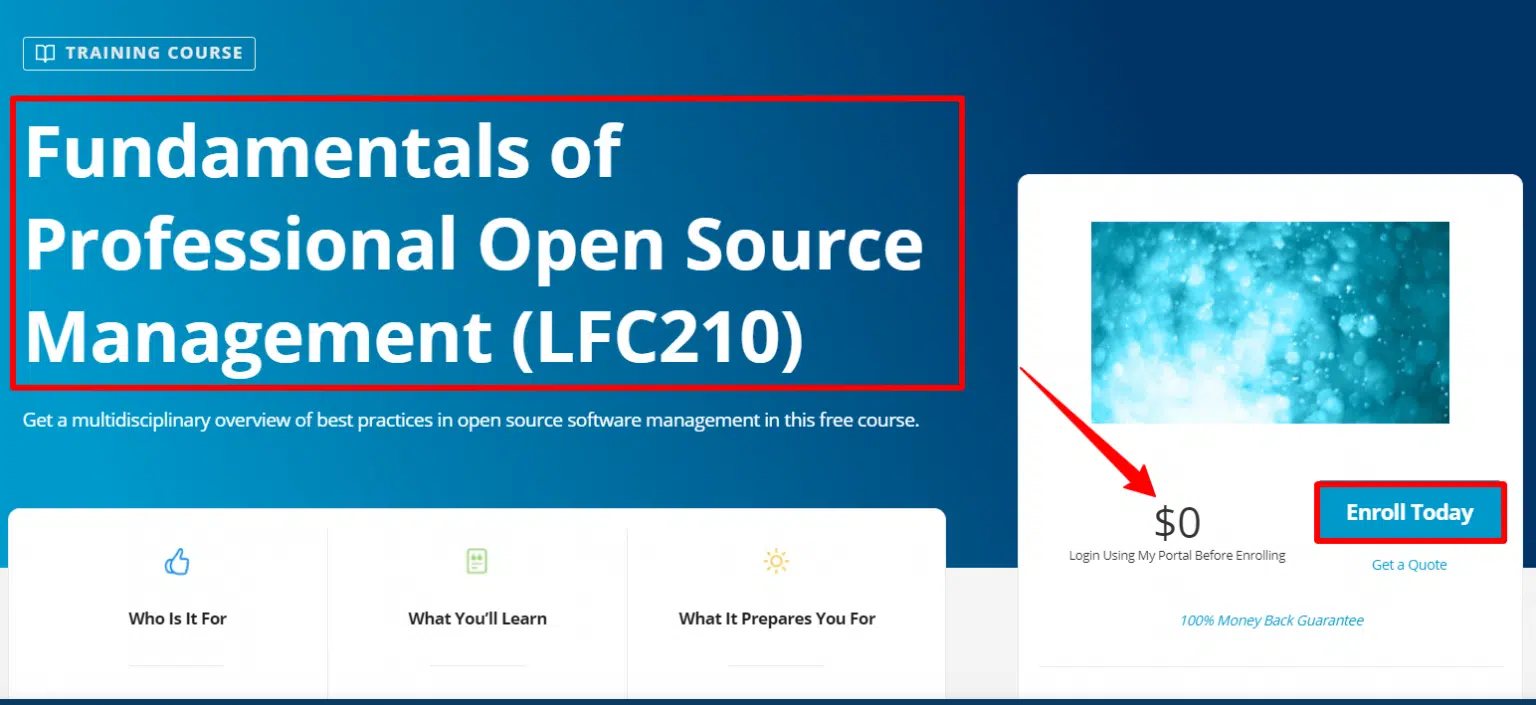
The course aims to teach you the phases of developing an open-source management program. The certification includes topics like open-source software and open-source management basics, open-source management strategy, open-source policy, open-source processes, and open source management program implementation.
The course description says that it is suitable for anyone concerned with or involved in open source management. It is also suitable for people who work in domains like software development managers, open-source program managers, software architects, developers and architects, and product managers of open source products.
The course is 20 hours and it is self-paced. The course contains five chapters and you get access to the course for 12 months.
A Beginner’s Guide To Open Source Software Development:
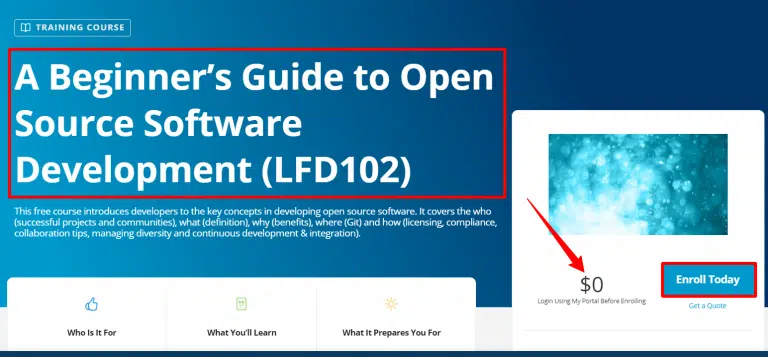
This course is made to train students in key concepts involved in developing open-source software, the benefits of OSS, tells you which open source projects form the foundations of today’s technology worldwide,
OSS Licensing issues, how to use projects such as FOSSology and SPDX, best practices for the long-term sustainability of projects, and a lot of other fundamentals of Open source software development.
The course is suitable for software developers who want to understand the rules of creating open-source software. It is suitable for both a beginner and an experienced professional.
The course contains 15 chapters on every aspect of Open Source Software Development.
Inclusive Speaker Orientation:
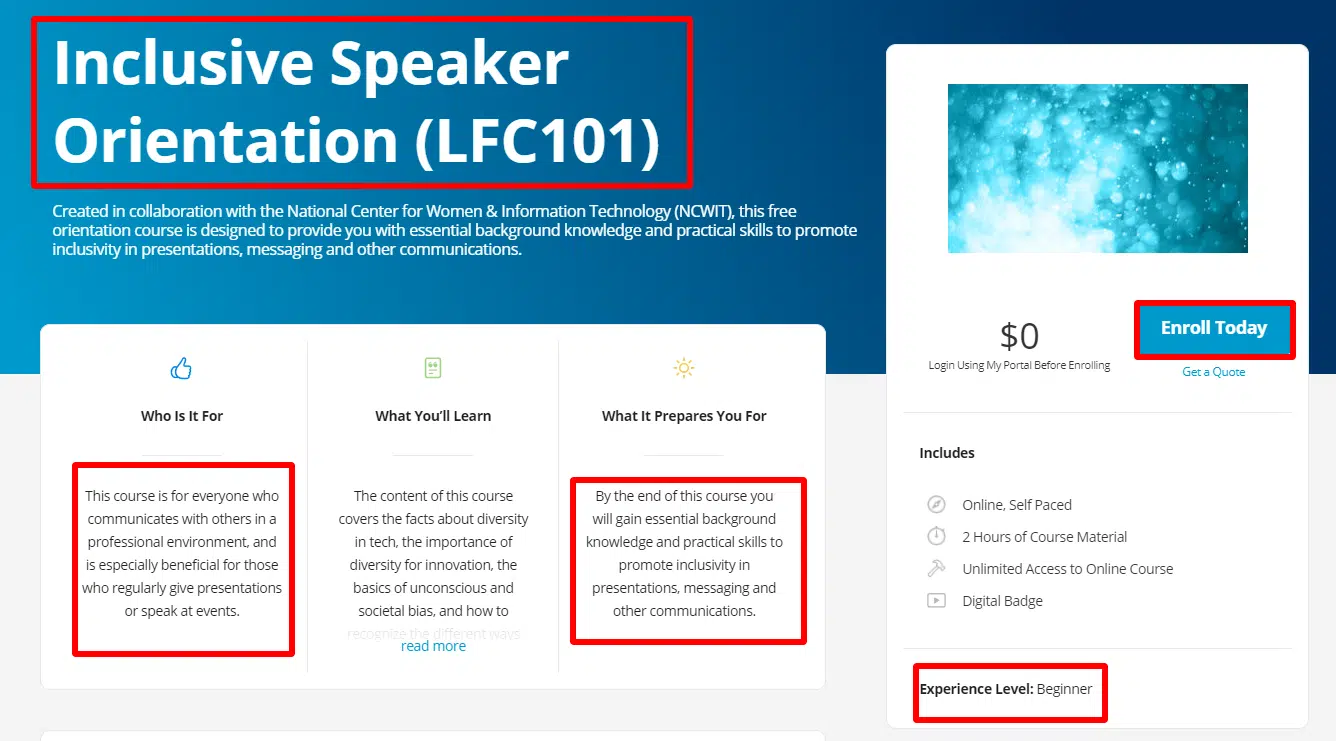
This course was created in collaboration with the National Center for Women & IT, this course is designed to provide students with essential knowledge and practical skills to promote diversity in the organization and in presentation, messaging, and other aspects of communication in professional life.
It also teaches you how to deal with unconscious bias in the technological field and become an effective communicator.
The course is suitable for everyone who wants to become an effective communicator, it is also a good course for anyone who communicates with people in the technology field on a day to day basis.
The course is just 2 hours long and has three modules. You get unlimited access to this course and it is a self-paced course.
Blockchain: Understanding Its Uses And Implications
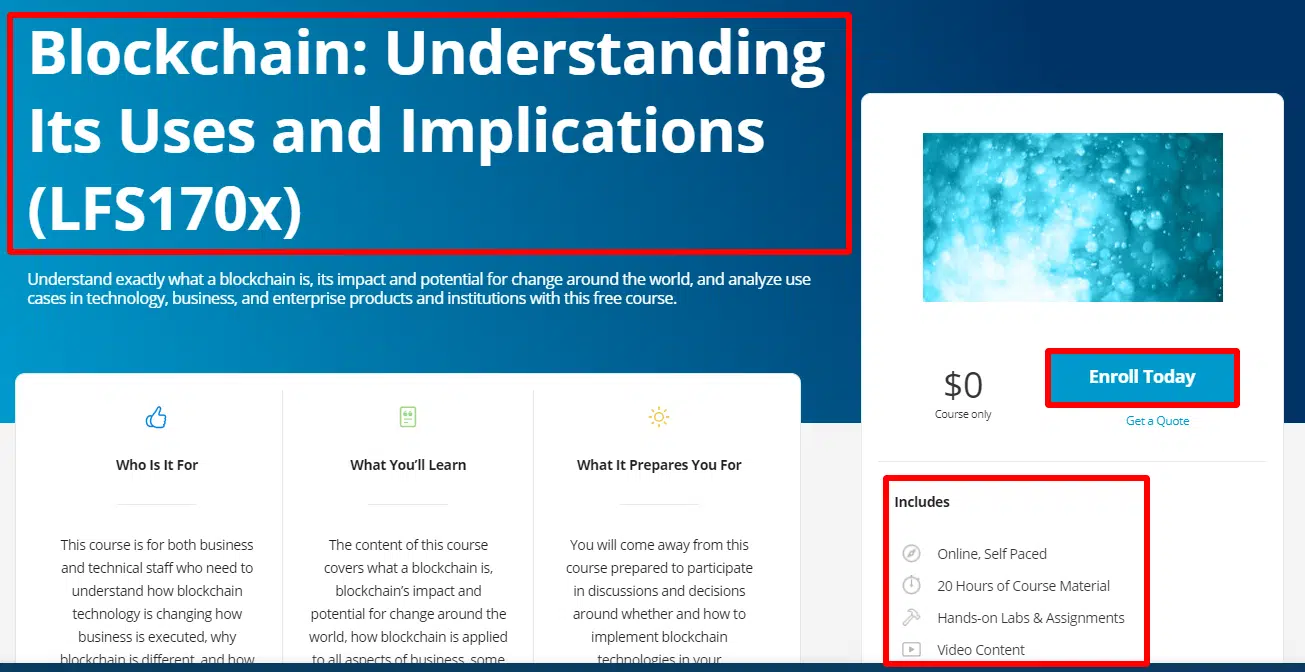
For every beginner who wants to understand blockchain technology, this course has it all covered for you. The course broadly discusses what blockchain, blockchain’s potential for change. How blockchain used across various business domains, and some case studies on the usage of blockchain in the real world.
As there is a lot of buzz around Blockchain technology and its uses in many areas, understanding bitcoin has become more and more important and this course by the Linux Foundation has done a great job in creating this course.
The course is suitable for both the business people and the people in the technology domain who want to understand Blockchain, how it is changing the whole business and technology scenario, what are the implications of this technology and a lot more. This Linux Foundation Blockchain course is about everything you must know about Blockchain technology.
The course consists of four chapters and a final exam at the end. It can take 20 hours for you to complete the course. One drawback is you have to pay for the certification while the course material is free and you have access to this course for 14 weeks.
Introduction To Open Source Networking Technologies:
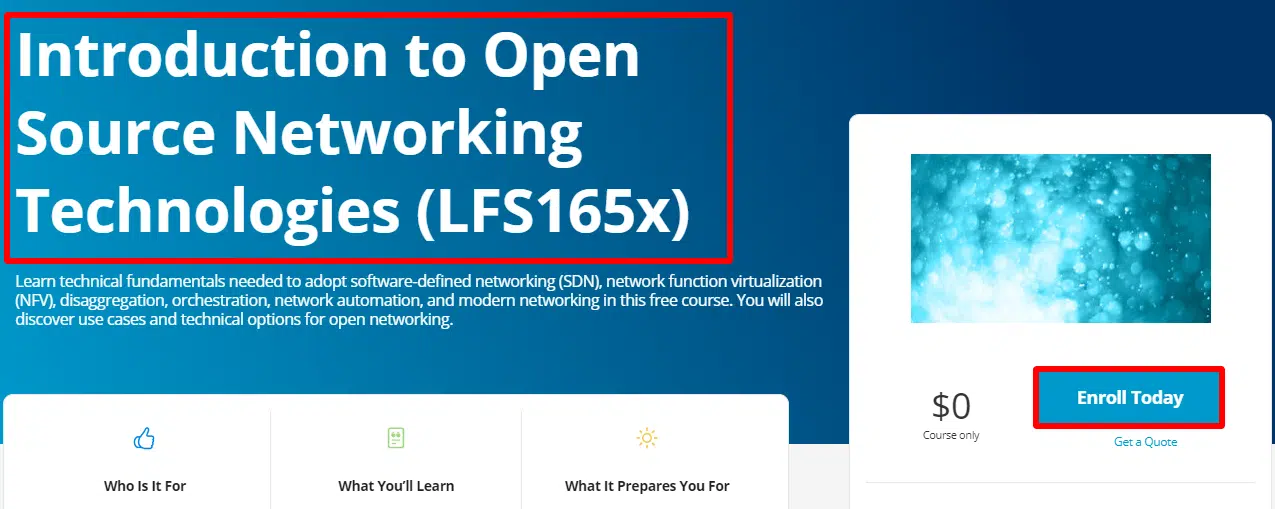
This is one of the most detailed courses by the Linux Foundation which covers so many aspects of Open Source Networking. In this course, you will learn about the software-defined and open source networking landscape.
You will further learn more about networking hardware is being disaggregated, what open network operating systems (NOS) are and how they run on different networking hardware, ways to automate networking tasks, how SDN controllers manage to underlay networks, what NFV is, and how it can help reduce the complexity of today’s data center environments, orchestration tools that can build a bridge between applications and networking, and more.
The course will make you familiar with major open-source networking projects and their case studies including Open Compute Project, ONIE, FD.io, OVS, IO Visor, DPDK, Open Dataplane, P4, OpenSwitch, Open Network, Linux, FRR, DANOS, FBOSS, ONOS, CORD, Open Security Controller, ONAP, OPNFV, PNDA, SNAS, etc.
It is specifically designed for people who are interested in Open Source including university students, engineers, network architects, security architects, systems engineers, etc.
It can take 40 hours to complete this course and you get 14 weeks of access to the course. However, to get a certification you need to pay otherwise the course content is free which includes 12 chapters and a final exam.
Introduction To Cloud Infrastructure Technologies:
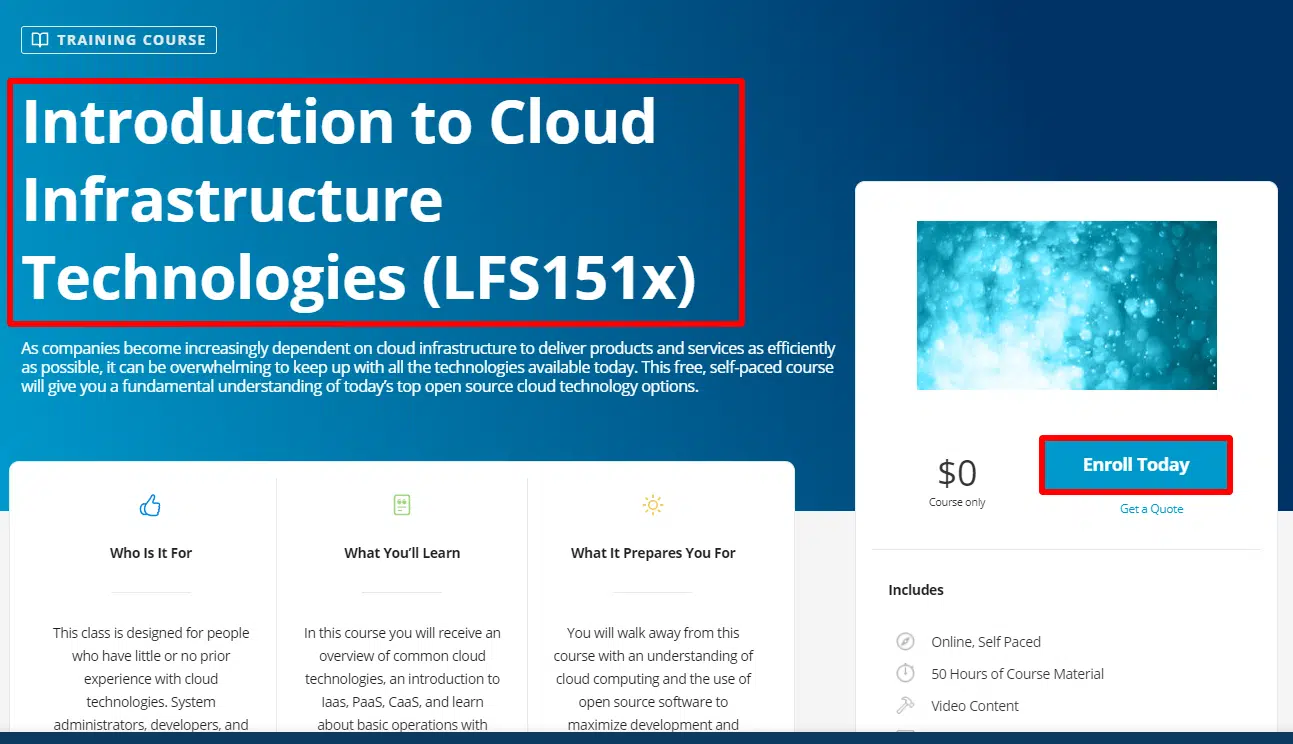
This course is best suitable if you want to get an overview of Cloud Technologies. This course provides an introduction to common cloud technologies like laaS, PaaS, CaaS.
You will also learn the fundamentals of operations with containers and images using Docker command, software-defined networking, and software-defined storage solutions, you will also get to know more about the skill sets needed to deliver next-generation cloud, and the challenges of cloud technologies.
After completion of the course, you will have a better understanding of cloud computing technologies and the use of open-source software.
The course is made for people who have little or no prior experience of cloud computing and related technologies. The people who can benefit from this course can come from backgrounds such as system administrators, developers, architects and everyone who is new to this field.
The course may take around 50 hours to complete and you get access to the course for 14 weeks. If you want a certification then you may require to pay for it otherwise the course content is completely free. There are 21 chapters to this course and 1 final exam
Introduction To Cloud Foundry And Cloud-Native Software Architecture:
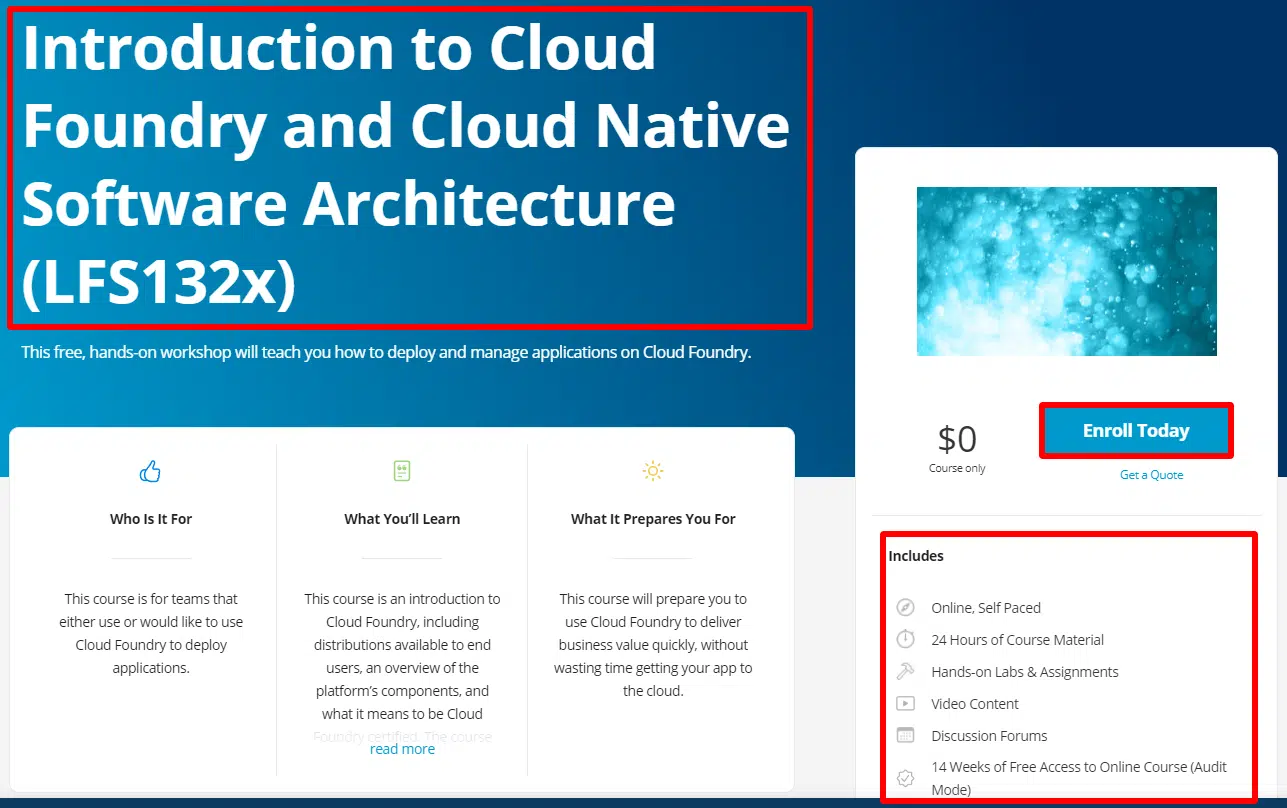
This course is a great introduction to Cloud Foundry. The course also includes distributions available to end-users, an overview of the platform’s components. How a certification in cloud foundry can help you.
The course also covers technical instruction on how to use the command-line interface. How applications are deployed, and basic debugging practices. The course has a workshop that will take. You through how cloud-native applications are built architecturally, and a lot more. The course is very well structured and it is up to date with current practices.
The course is best suited for the teams that use or are about to use cloud foundry to deploy applications. Course will equip you and give you enough skill set. That is required to use Cloud Foundry to deliver business value quickly and efficiently.
The course may take 24 hours to complete and you get access to 14 weeks. The certification for the course is paid; however, the whole course content is available for free. The course contains 6 modules.
Paid Courses Available On Linux Foundation: How Much Does Linux Certification Cost?
Now let us move ahead with discussing paid courses on Linux Foundation course reviews.
Introduction To Linux, Open Source Development, And GIT (LFD301):
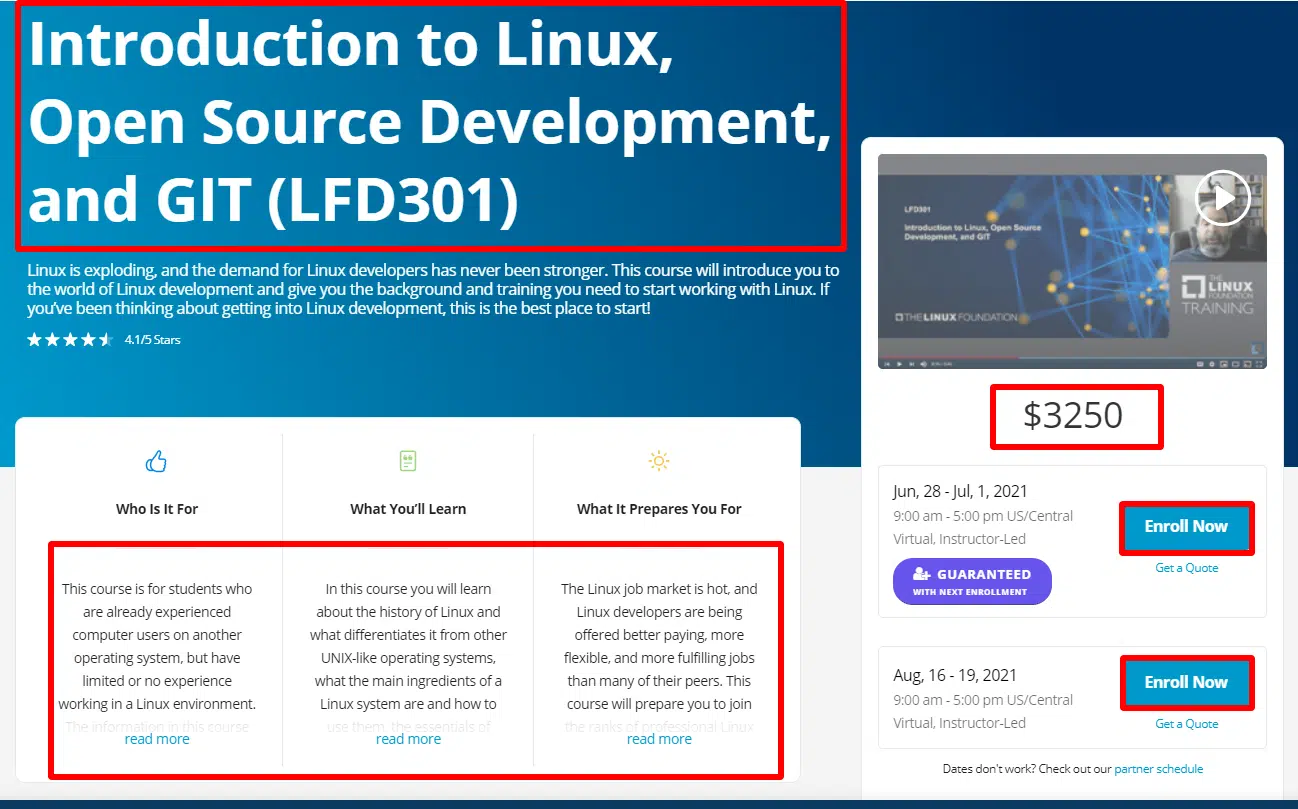
This course is delivered by 4 days of online live virtual classes or you can even opt for classroom training. So, make sure that you book your 4-day slot for the course before it gets filled.
In this course, you will learn in detail about the history of Linux and what differentiates Linux from other UNIX-like operating systems, what are the main components of a Linux system, how to use these components, and what are the essentials of the system administration.
You will also learn more about networking and threading models, aspects of compiling and using libraries, working with JAVA under Linux, and a lot more. After completion of this course, you may apply for many job opportunities which require Linux professionals and developers.
The course is best suitable for students as well as working professionals who are experienced in different operating systems but have limited exposure to Linux operating systems.
The course has a plethora of hands-on lab assignments, course manuals, and materials for a stronger theoretical base. This course is pretty expensive but it is worth the investment because it covers many topics and gives you a strong foundation in Linux. You can enroll in this course for $3250.
Kubernetes Fundamentals (LFS258):
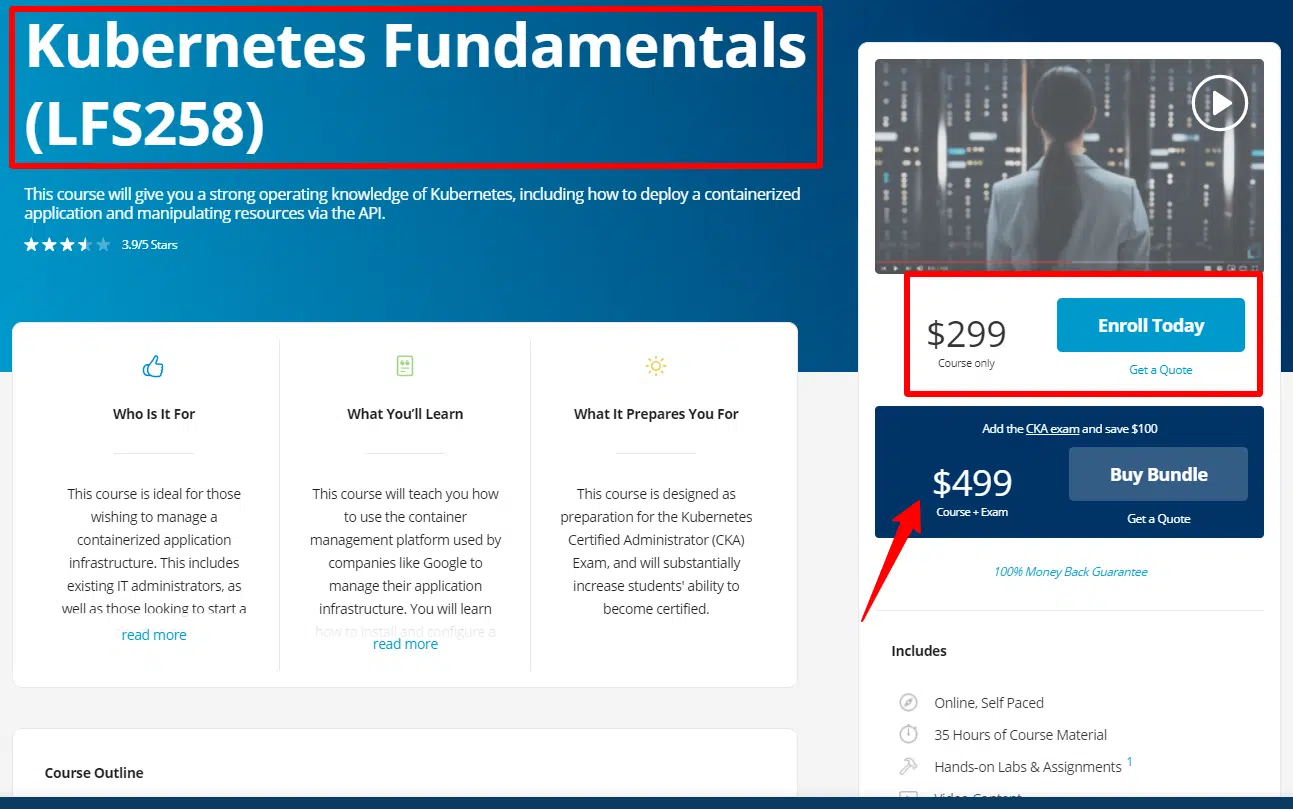
The course costs you $299 however if you want to take an exam and get certified you need to pay $499. The course delivered through pre-recorded video lessons and can take 35 hours to complete. After payment, you get 12 months of access to the course. The course contains 17 lessons and one exam.
Coming to the course, this course made for someone who wishes to make a career in managing containerized application infrastructure. The course is ideal for existing IT administrators, as well as for the people who are looking forward to making a career in Cloud Computing.
The course will teach you how to use the container management platform used by companies like Google to manage their application infrastructure. You will further learn about how to install and configure a production-grade Kubernetes Cluster, from network configuration to upgrades to making deployment available via services.
The course will equip you with a sufficient skillset to start using Kubernetes on your own. The course designed as a base for students preparing for the Kubernetes Certified Administrator (CKA) exam.
you can also check out The Top 10 Best Free And paid Kubernetes Courses For Developers In 2021
Essentials Of Linux System Administration (LFS201):
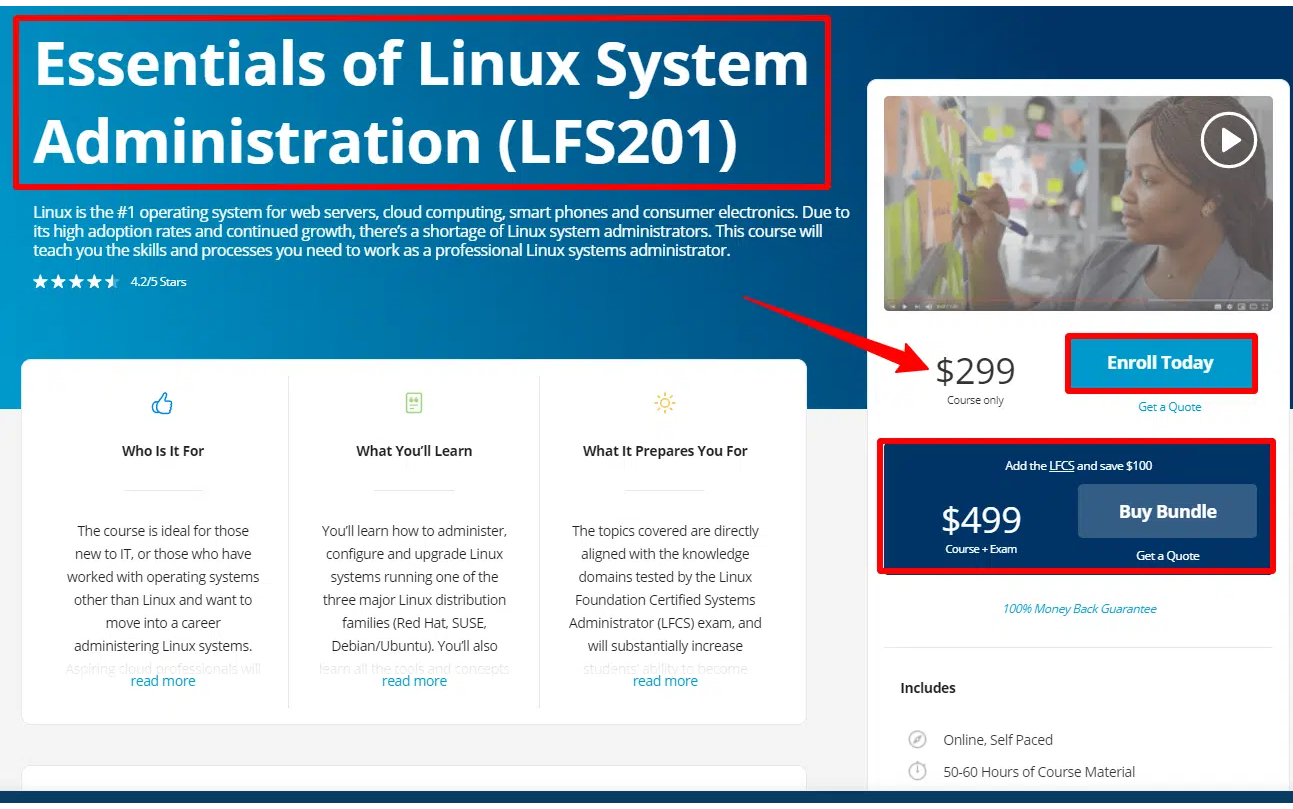
The course costs you $299 however if you want to take an exam and get certified you need to pay $499. The course is delivered through pre-recorded video lessons and can take 50 to 60 hours to complete. After payment, you get 12 months of access to the course. The course contains 44 lessons and one exam.
The course is ideal for those who are new to the field of Information Technology or those who want to learn more about Linux and make a career in administering Linux Systems. The people who aspire to make a career in Cloud Computing will also benefit from this course as it also introduces you to basic cloud computing and cloud technologies.
The course will teach you in detail about administering, configure and upgrade the Linux systems which run on one of the three major Linux distribution families i.e. RedHat, SUSE, Ubuntu/Debian.
The course will increase the student’s ability to clear the Linux Foundation Certified Systems Administrator (LCFS) exam and give a boost to their Career.
Linux Foundation Certified System Administrator (LFCS):
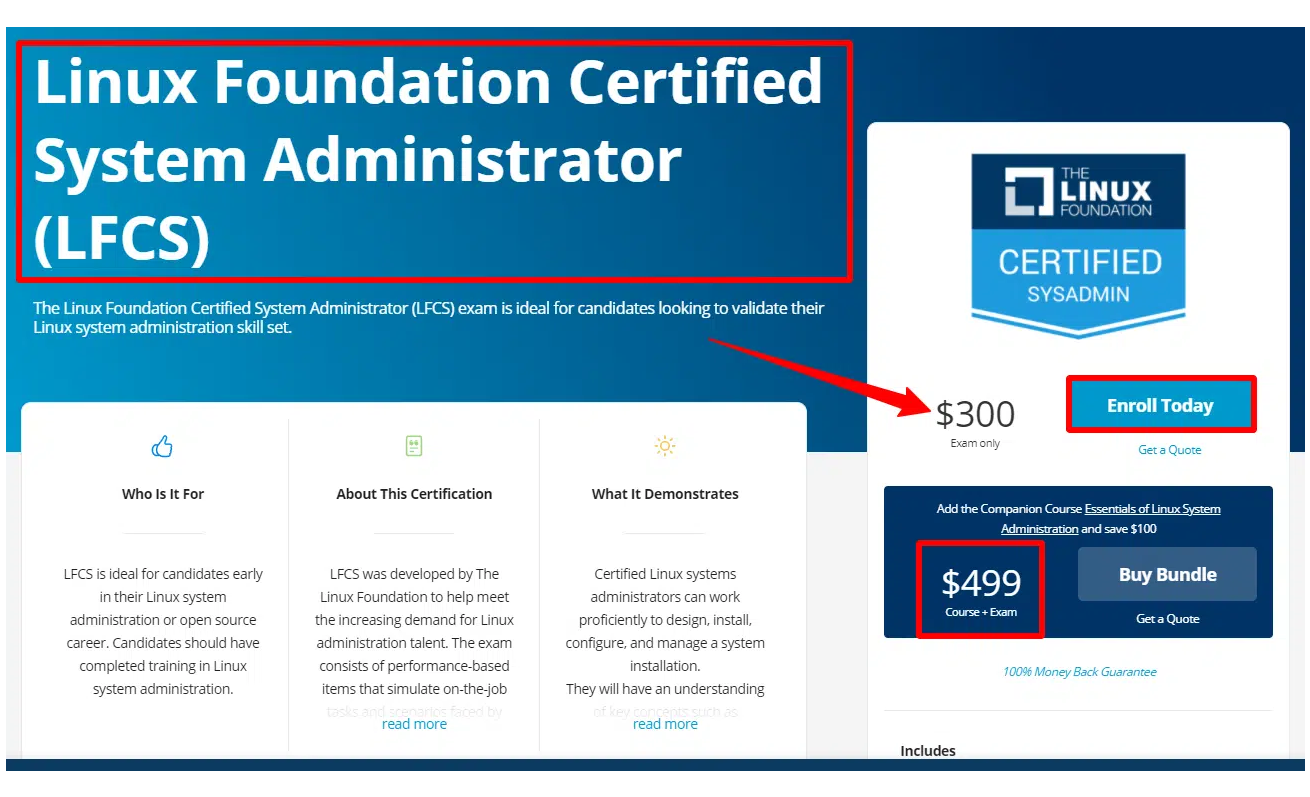
This is one of the most prestigious certifications offered by the Linux Foundation. The course is a great opportunity for people who are fresh university pass-outs and candidates who are just beginning with Linux System administration.
The course takes you through many aspects of the Linux System that include essential commands, Operation of running systems, user and group management, networking, service configuration, and storage management. Certified Linux system administrators can work proficiently in areas like design, install, configure, and manage a system installation.
The certified candidates will also have an in-depth understanding of key concepts like networking, storage, security, maintenance, logging and monitoring, application lifecycle, troubleshooting, API object primitives, and a lot more.
The course also gives you access to the Linux Foundation Certified System Administrator study guide. The course plus exam can cost you $499 and if you can prepare yourself and just want to give the exam then the cost of the exam is $300. I recommend you to take a course plus exam for a better understanding of the key concepts. Certification is valid for 3 years and the exam duration is 2 hours.
The Linux Foundation Certified System Administrator salary expectations can range from $76000 to $1,20,000
Linux Foundation Certified Engineer (LFCE):
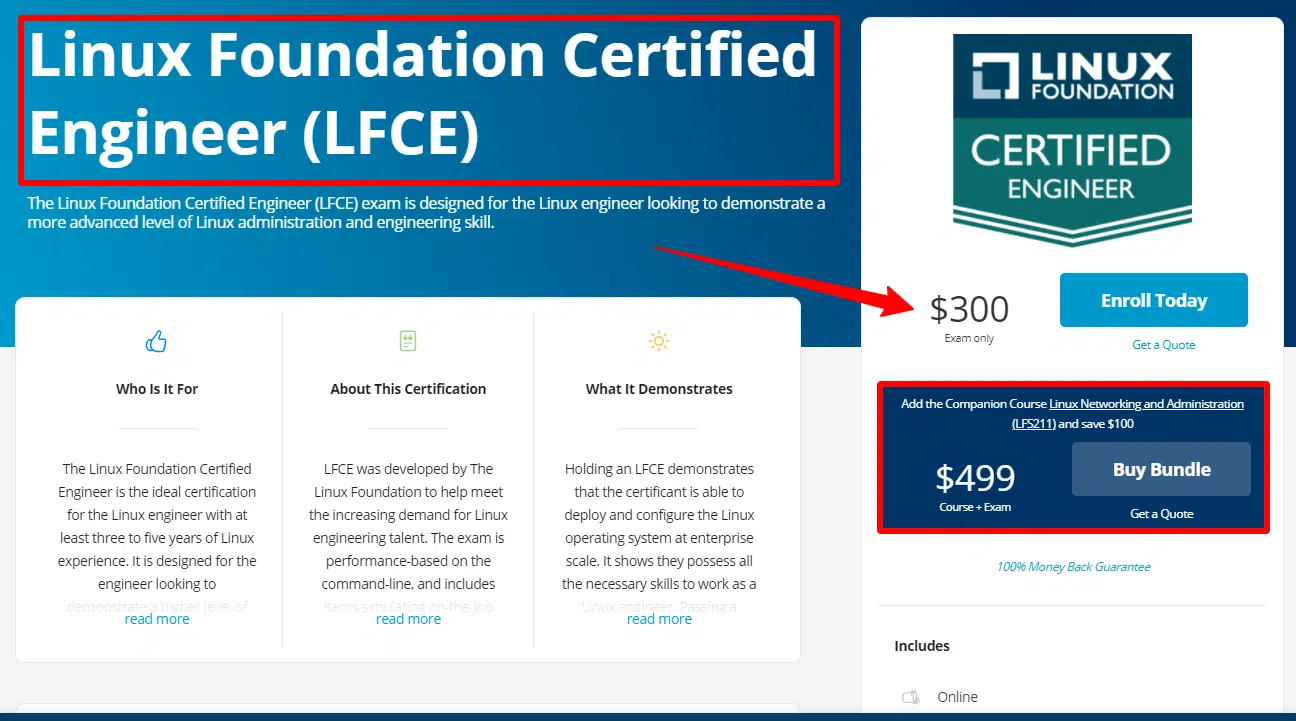
Another prestigious program by the Linux Foundation is Linux Foundation Certified Engineer. It is great for people who want to become or start off as Linux Engineers.
The course is suitable for an engineer with three to five years of Linux experience. It is an ideal certification for developing your skillset. This certification can help you qualify for higher ranks in your organisation and promotion.
The LFCE certification is valid for 3 years and the exam duration is 2 hours. The course plus exam (certification) can cost you $499. However, if you can do self-study and just want to give the exam, you can appear for the LFCE exam for $300.
Other Courses And Areas Available On Linux Foundation
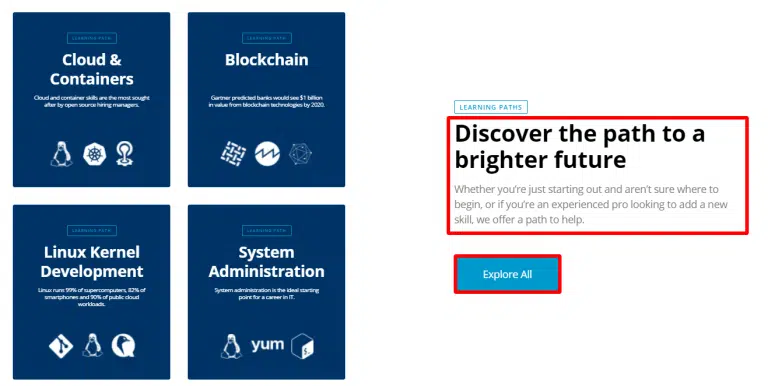
Linux’ catalog includes 21 certification programs and 102 training programs in the domains like System administration, Cloud & containers, Networking, Blockchain, Linux Kernel Development, IoT & embedded development, web & application development, systems engineering, DevOps & Site reliability, open-source best practice, and AI/Machine learning.
You can also learn a lot about technologies such as 5G, AI, Cloud Foundry, Docker, Edge Computing, EDgex foundry, embedded Linux, envoy proxy, Fin Ops, Fluentd, GraphQl, Helm, Hyperledger, Jenkins, Kubernetes, Linkerd, Magma, ONAP, OpenDaylight, OpenJS/Node.js, OPNFV, Prometheus, RISC-V, TARS, web assembly, etc.
You can take any courses from their catalog and Linux Foundation Training and Certification will ensure that you get quality education, course content and equip yourself with skills of the next generation.
Types Of Projects (Start Project With Linux Foundation Review Now)
You can work on a variety of projects with the Linux Foundation, including:
-
Community Projects
Projects hosted by the Linux Foundation benefit from its governance structure and back-end resources. SPDX, FOSSology, CHAOSS, Linuxboot, and OpenBMC are all hosted projects.
-
Community Projects & Funding
These Projects raise funds from the public to provide resources and infrastructure, such as code repositories, continuous integration systems, testing resources, conformance program resources, and developer events.
These projects do not have to contribute technical or financial support from their membership. Node.js, OpenAPI Initiative, Open Container Initiative, Open Mainframe, Xen Project, and Zephyr are among these projects.
-
Umbrella Community + Funding
Various projects are funded through the same mechanism and center on technology. This will enable the community to pursue a strategic vision across a variety of opportunities while also balancing resource demands.
The Linux, Automatic Grade, Cloud Native Computing, Foundation, Hyperledger, LF Networking, and LF Deep Learning Foundation are these projects.
Linux Foundation Training Review: Case Studies Of Linux Foundation
Linux has always been devoted to the creation of open-source technologies. Let us quickly discuss some of the cutting edge technologies developed by Linux:
- Free OS
- Hyperledger
- Encryption
- Automated Grade Linux
- Open Network Automation Platform
- Cloud-Native Computation
- Node.JS
The Linux Foundation provides a neutral, trusted home for developers to collaborate on open technology projects
Free Operating System:
Linux is the most prominent example of free and open-source software collaboration. The source code of Linux may be used, modified, and distributed commercially or non-commercially by anyone under the terms of its respective licenses. 90% of all cloud infrastructure is powered by Linux including super-computers and cloud providers. 74% of all the smartphones in the world are Linux-based.
Linux Foundation Hyperledger

Hyperledger is an open-source community that is focused on developing a group of stable frameworks, tools, and libraries for enterprise-grade blockchain. Linux foundation hyperledger was started in the year 2015 as an umbrella project of open-source blockchain and related tools.
Hyperledger received support from companies like IBM, Intel, and SAP. In January 2018, Hyperledger launched production-ready Sawtooth 1.0, and later in 2019, the first Hyperledger Fabric v1.4 was announced.
The objective of the Hyperledger project is to advance cross-industry collaboration by developing blockchains and distributed ledgers, with a major focus on improvising the efficiency, reliability, and capacity of these blockchain systems so that they are capable of supporting global business transactions by major technological, financial and supply chain companies.
Let’s Encrypt:
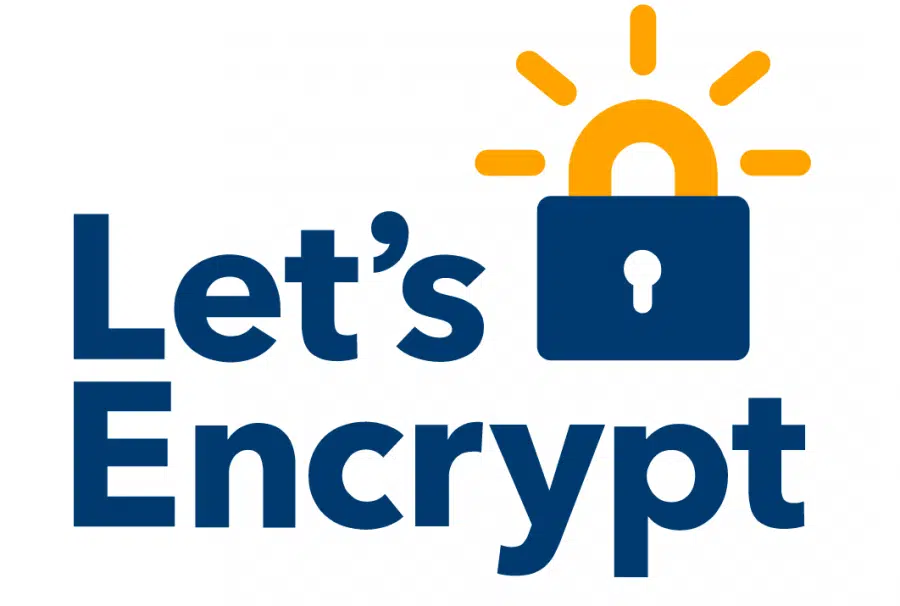
Let’s Encrypt is a free and automated open certificate authority. It gives people the digital certificates they require to enable HTTPS for websites, for free. The main motto of Let’s Encrypt is to create a more secure and privacy-respecting web.
Let’s Encrypt is the world’s largest open certificate authority to enable HTTPS for websites and more than 265 million websites across the globe use this certificate. Certificates issued by Let’s Encrypt are valid for 90 days
and during that period renewal can take place any day and it is done by an automated process created by Let’s Encrypt. Let’s Encrypt is meant to decrease the complexity of setting up and maintaining a TLS server.
Let’s Encrypt is one of the most transparent organizations which increases its trustworthiness and for this purpose, they publish transparency reports as well.
Automotive Grade Linux:
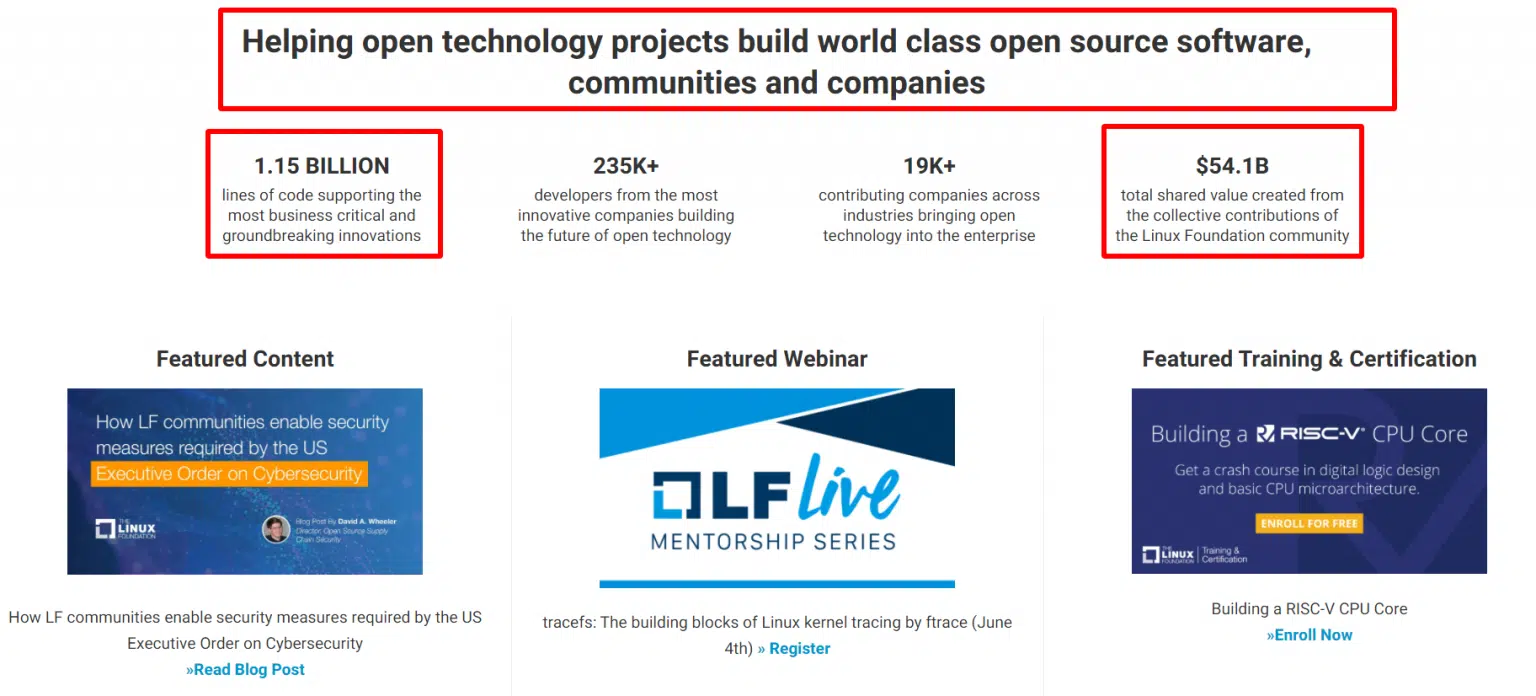
Automotive-grade Linux is a collaborative open-source project that brings together automakers, suppliers, and other technology companies to develop and accelerate the adoption of a fully open software stack for the connected car.
AGL is developing a platform from scratch that can form an industry standard to enable the rapid development of new technologies.
Automotive Grade Linux was launched in 2012 with the support of founding members which included big names such as Jaguar Land Rover, Nissan, Toyota, DENSO corporation, Fujitsu, HARMAN, NVIDIA, Renesas, Samsung, and Texas instruments. Today AGL has more than 146 members.
Cloud-Native Computing Foundation:

CNCF hosts critical and important components of the global technology infrastructure. It brings together the finest developers, end-users, and vendors and hosts the largest Open Source developer conferences to exchange ideas and initiate discussion.
Cloud-native technologies enable organizations to build and run scalable applications in modern and dynamic environments including public, private, and hybrid clouds.
Founding members include Google, CoreOS, Mesosphere, Red Hat, Twitter, Huawei, Intel, Cisco, IBM, Docker, Univa, and VMware. At present, CNCF is supported by more than 450 members.
My Experience Of The Linux Foundation Courses: Are Linux Foundation Courses Worth It?
Yes, Linux Foundation training is worth it. The courses are intended to assist you in passing your certification tests.
Although Linux Foundation training does not ensure that you will pass, it does provide interactive learning so that you will be better prepared for the exam and will be able to achieve your certification.
Below, I summarize my experience with the Linux Foundation Courses to help you determine if it’s appropriate for you.
What I Liked About Courses Provided By Linux Foundation?
- Prestigious: The best thing about the courses provided by Linux Foundation Training and Certification is the amount of trust the industry has shown towards Linux. It is prestigious and holds a lot of weight.
- Variety: Every course is different in its own way and yes, there are so many courses from almost every technological domain. Linux has focused a lot on value creation and with every certification you complete, you add a lot of value to yourself. They haven’t made the courses just to show a long catalog, they are serious about what they are creating.
- Up-to-date courses: Are all the courses up to date? Well, some courses are well updated and give you an enormous amount of practical and theoretical knowledge about the topic, however, some lag behind but we can’t complain about that as the technological scene across the globe is changing at a really fast pace. However, be rest assured that Linux will update its courses from time to time and keep introducing new things.
- Large catalog: The courses do not focus just on Linux, there are courses available on Linux Foundation which are on Linux-adjacent technologies as well. You will even find courses related to BlockChain, web development, cloud computing, etc. there are many topics that Linux has covered and you won’t find them anywhere else.
- Extra support: In many courses on Linux Foundation Training you will find that courses come with many workshops, hands-on training, live training sessions with Linux Experts, etc., and believe me that they are worth it!
So, yes it does make sense and it is worth it if you want to enroll for any course of your interest on Linux Foundation and get a respected name on your resume and unlock the box of opportunities for yourself.
Which Are The Areas Where Linux Foundation Training Can Improve?
- Pricing: While many courses are free and have free access to course content, there are many good courses that are very expensive to purchase and you must think before investing
- Not in-depth: I found that paid courses are very in-depth but the courses which are provided by Linux for free are not so detailed and lack in-depth knowledge.
My Personal Journey With Linux Foundation Training Programs
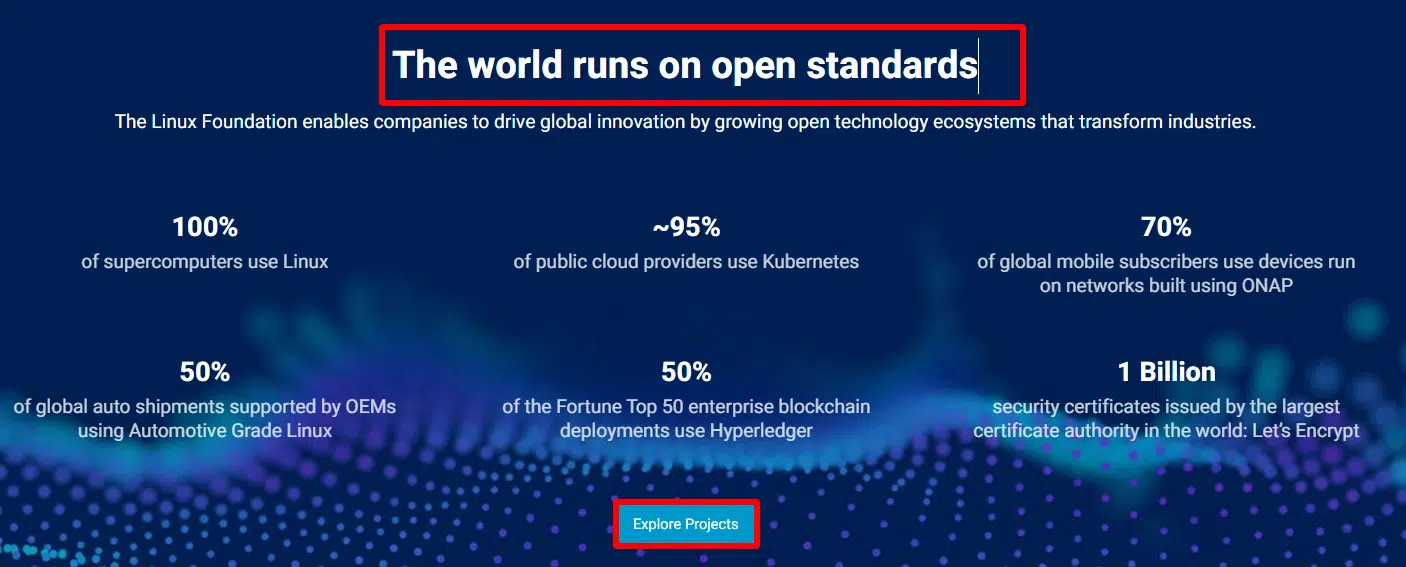
Initially, I was fretted up as you’re now. However, I took advice from my seniors and got into it without any doubt later. Later, I came to know that the trust factor with their entire course is commendable.
As I keep reading and learning, I start feeling the progress in the curriculum. However, there are certain things that I did not like was some outdated curriculum.
But, they also provide a paid course that helps to feel more comfortable. Apart from these things, the categories and quantities of the course were great.
Linux Foundation Training Review: Who Should Take These Courses?
The Courses provided by Linux Foundation Training & Certification are ideal for people belonging to these categories:
- Entry-level IT and Computer Engineering/Science students who want professional training in various technology domains and especially wish to work in the Linux Environment.
- Enterprise Teams: for every organisation, it is difficult to keep the whole team on the same page. To make it easier for the organisation, organisations can get their teams to take these courses and establish knowledge symmetry. Organisations can also invite Linux for various live sessions and workshops to train their employees.
- Aspiring Cloud Engineers
- Those who wish to Hone their skills or improve their skillset
These courses can also help students and aspirants who want to make a career in fields like cloud computing, open-source development, Linux systems, IT, etc.
What Is The Cost Of Linux Foundation Courses?
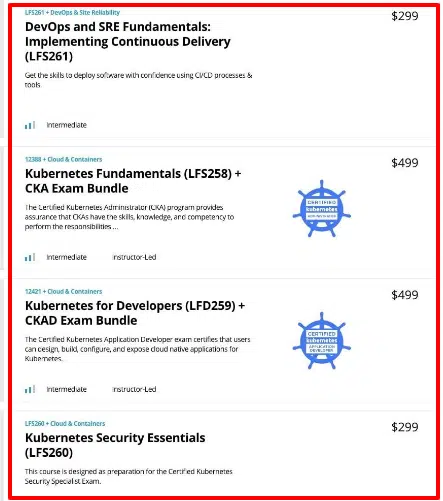
The price of every course available on Linux Foundation Training & Certification differs from course to course. Linux Foundation prices their courses individually and does not offer any monthly or annual subscription on membership hence, you have to buy each course separately and complete it within the access period.
How Much Is The Linux Exam? Linux Foundation Training Foundation Review: Pricing Plans
The price of every course can range from free courses to courses that can cost you around $3200. However, most courses fall in the bracket of $300 -$400 and you can take those and increase your skillset.
There are a plethora of free courses which can give you beginner-level knowledge in a particular domain. When it comes to quality training, course content, boot camps, practical know-how, Linux has made sure that courses provide all these to the learner.
However, Linux isn’t an accredited education body so you won’t any continuing education credit. The certification from Linux respected in the industry and it increases your brand value.
Linux over the years has gained a lot of goodwill from the industry and is known for its quality be it in the technology field or training and certification.
So if you are serious and have a relevant interest in the fields where Linux has its footprints, you must get these certifications and improve your career prospects.
Linux Foundation Career Opportunities: What Careers Use Linux?
The Linux Foundation, in collaboration with the rest of the open-source community, plans to address difficult challenges by investing a large amount in shared technology.
The Linux Foundation collaborates to help create environments for open-source ventures to grow for the long term.
Collaborate with world-leading designers and organizations, provide the necessary devices, training, and opportunities to scale any open source venture.
A Virtual Workforce
The Linux Foundation powered virtually, with employees in 36 states and four countries. Employees given a stipend to buy their own computers, rent co-working spaces, and equip their home offices. Communication tools include Slack, Skype, and Google Hangouts.
Supporting Employees
The Linux Foundation has a culture of supporting employees, with a mission-driven focus on how it can have an impact on society. The company provides health care for families and individuals, unlimited Paid time off, 12 weeks of parental leave for primary and secondary caregivers.
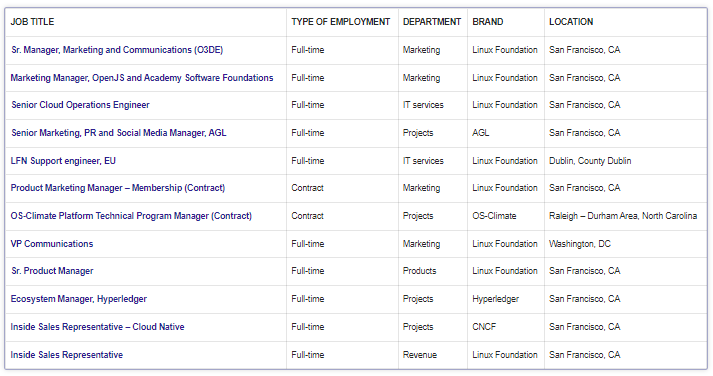
Some People Also Ask Questions Related To Linux Foundation
Below I have shared some questions that people ask on Google, you can find all the questions related to Linux foundation training, certificates, membership program, job opportunities, and much more, I personally pick all these questions, and wrote the answers with my personal experience.
Is Linux Foundation Training Good?
The Linux Foundation is a viable alternative to Netflix-style Linux video training. The Linux Foundation’s cloud engineer Bootcamp provides an accelerated learning environment while covering the needed topics for entry-level cloud engineering.
Can I Cancel CKA Exam?
You can cancel or reschedule your exam reservation 24 hours before the anticipated start time. You forfeit it if you wait less than 24 hours, and adjustments are not allowed.
What Is Linux Foundation Certification?
Candidates who want to confirm their Linux system administration skills should take the Linux Foundation Certified System Administrator (LFCS) exam. The test is made up of performance-based questions that reflect real-world tasks and scenarios faced by system administrators.
How Can I Get Free Linux Foundation Courses?
The Linux Foundation teamed up with edX to offer free online courses on a variety of open source topics, including Linux, blockchain, networking, and cloud computing.
FAQs Realted To Linux Foundation Courses Review
Is Linux Foundation Training Worth It?
Well in one word it is amazing. Linux foundation training has a large catalog of courses from many domains of technology and you can learn whatever interests you. The courses are practical, Linux keeps updating the course curriculum. As per the needs of the students, and provides a great learning experience. Some paid courses also have hands-on workshop training, live sessions, etc. All this can provide you with in-depth knowledge and know-how of the particular subject.
How Can I Get Linux Certification For Free?
Linux provides many courses which are completely free and gives you an enormous amount of knowledge, to begin with. Some courses provide free access to course content however, to get a certification you need to pay.
How Do I Become Linux Certified?
By completing any of the courses or certifications provided by Linux Foundation and passing. The exam of that course you can get Linux Certified. Linux Foundation provides many free and paid courses on many domains of technology.
How Does The Linux Foundation Work?
The Linux Foundation a non-profit organization that dedicated to the growth of Linux and its open-source technologies. The Linux Foundation dedicated to expanding and carrying forward the works of Linux Founder Linus Torvalds. Linux Foundation supported by leading technology companies and developers and a presence across the globe. The main work or responsibility of the Linux Foundation to promote, protect, and advance Linux and Linux-adjacent technologies. Linux foundation does it by channeling the resources of its members. The large Open-source community across the world and ensures that Linux is free and technologically advanced.
Can I Get A Job With Linux Certification?
Linux a big name and brand in the technology world. It gained an enormous amount of Goodwill and prestige in its three-decades-long journey. This made Linux one of the leading organizations which are committed to the democratization of technology. Hence, if you can get certified by Linux and gain deeper knowledge and understanding of its open-source technologies, you can apply for Job in almost any area of your interest and can work in the Linux Environment smoothly.
What Job Can I Get With Linux?
There are many job roles in which you can apply after completing relevant certifications and courses provided by Linux Foundation. Some of the major job roles where you can apply are related to software engineer, system administrator, DevOps, Java developer, Systems Engineer, network engineer, web developer, Linux Engineering admin, TechOps Engineer and many other job roles relevant to your academic background and the course which you complete from Linux Foundation.
How Much Do Linux Jobs Pay?
According to Salary, Linux Administrator Salary in the US is on average $96,323 per annum, if you are in the 50th Percentile. The salary can increase if you are in the upper percentile range, if you fall in the 90th percentile, you can earn as much as $1,20,000 per annum. Lastly, if you fall in lower percentiles you can earn $76,000 per annum. The salary may differ from company to company and job role to job role. But you can rest assured that certification from Linux will give a boost to your skill set and improve your personal brand.
Is The Linux Foundation In Partnership With EdX?
The Linux Foundation has partnered with edX to deliver a series of MOOCs. The range of entry-level courses by Linux Foundation delivered through the EdX platform covers many beginner levels and popular open-source technologies. These courses by Linux Foundation Training on EdX can provide foundational knowledge to students which they can use to go to advanced courses.
How Can I Get Notified About New Training Courses And Certifications By Linux Foundation?
For this, you can sign up for the Linux Foundation newsletter to know more about their new course offerings, workshops, discount coupons, seminars, live training sessions, etc. the newsletter can also tell you about current happenings in the Open Source technology world. To sign-up for the newsletter, all you have to do is fill up the STAY TO DATE. Which can found at the bottom of the Linux Foundation’s official website.
How To Buy Courses In Bulk From The Linux Foundation For My Team/Company. Who Can I Talk To?
Linux Foundation Training provides many customized training programs for corporations and teams. If you want to purchase courses in bulk for your team all you have to do is submit a corporate training inquiry through their official website and a member of their team will reach out to you for further process and considerations.
How To Contact The Linux Foundation?
For general inquiries, you can contact through this email address: [email protected] For inquiries related to events and conferences, you can send your email to [email protected] For inquiries related to training and certification, you can send your email to [email protected]
What Is The Difficulty Level Of Linux Foundation Certification?
The certifications which are tagged as Beginner level are somewhat easy as they deal with basic concepts and introduction to that subject. However, the professional certifications and higher-level courses are intensive and full of practical knowledge. So you may need to put in efforts to complete those certifications.
Is Linux Certification Worth It?
Well, if we look at the respect that Linux foundation enjoys from the industry and the goodwill it has earned over the years I can assure you that Linux Foundation training certifications are worth it and it will add a lot of value to your Resume.
Is Kubernetes Certification By Linux Foundation Worth It?
Yes, the Kubernetes certifications by Linux foundations are worth it as these certifications are in-depth and give you the proper understanding of all the Kubernetes domains. Also, as the certifications and training are provided by Linux Foundation, you can expect nothing but the Best out of everything
How Long Do I Have Access To Linux Foundation Courses And Certifications?
Generally, all the certifications provide you with 12-month access to the course and within that period you expected to complete the course and certified.
Are There Any Prerequisites For The Exam?
No, there are no pre-requisites to take care of before any certification exams, However, you need to get CKA certification before you go ahead with CKS certification.
When Should I Expect The Results?
You can get your report card within 24 hours from the completion of the final exam. Results made available on the course portal.
Can I Swap One Linux Foundation Course That I Purchased To Get Another Linux Foundation Course?
No, you cannot go for substitution and course swaps.
Can I Purchase Several Bundles Or Courses For Several People At The Sale Price?
You can add at the max of 5 students per purchase. If you wish to purchase multiple bundles please contact at trainingsupport.linuxfoundation.org
Can I Reschedule CKAD?
If you don’t arrive on time for your exam reservation. You’ll be classified as a no-show and forfeit the money paid for the exam. The exam cannot rescheduled.
How Long Does It Take To Learn Linux?
If you use Linux as your primary operating system, it will take a few days to learn how to use it. You can spend two or three weeks learning the basic commands if you want to learn how to utilise the command line.
How Difficult Is CKA Exam?
The exam requires three hours of dedicated effort to complete 24 questions, but it is rewarding if you enjoy solving problems.
Which Is The Best Linux Certification?
- Linux+ CompTIA.
- LFCS (Linux Foundation Certified System Administrator)
- GCUX – GIAC Certified Unix Security Administrator.
- LPI (Linux Professional Institute)
- LFCE (Linux Foundation Certified Engineer)
Who Provides Kubernetes Certification?
The Linux Foundation offers Kubernetes certification programs. The Linux Foundation offers four different Kubernetes certifications, two for professionals and seekers, and two for enterprises.
Which Is Easier CKA Or CKAD?
CKAD is not simple because it lacks topics on cluster administration. The CKA exam lasts 2 hours, whereas the CKAD exam lasts 3 hours. Your organization needs three or more CKAs to become a Kubernetes Certified Service Provider.
How Useful Is CKAD?
You can become a KCSP by getting three CKAs. You’ll become more useful to your managers and improve your organization by getting the CKAD and then the CKA. Get a CKAD if you want good pay, a chance of securing a job, and preparation for the CKA.
Is Linux In Demand?
According to 74 percent of hiring managers, Linux is the most in-demand talent. 69% of businesses look for candidates with cloud and container experience, up from 64% last year. Security is also important, with 48% of employers looking for this skill.
What Is The Easiest Kubernetes Certification?
The CKAD is for developers who will deal with Kubernetes. You’ll need to know programming languages, runtimes, and application concepts and architectures. The CKAD focuses on Core Concepts and is the easiest of the three tests.
How Long It Takes To Prepare For Kubernetes?
To prepare for an exam, you’ll need to study and practice. Many excellent engineers study for four months putting in two to three hours per day.
Is Windows 10 Better Than Linux?
Linux is faster than Windows because Linux has a current desktop experience and operating system qualities, whereas Windows is slow on older hardware.
How Do I Become Good At Linux?
- Learn to program in a programming language.
- To solve the problems, use the terminal.
- To receive help, use IRC channels.
- Experiment with different distributions.
- As your primary operating system, use Linux.
- Experiment with various desktop environments.
Is Kubernetes A Docker?
Docker is a tool that allows you to create, distribute, and run containers. Kubernetes is a more comprehensive container orchestration system for Docker containers than Docker Swarm. It’s designed to efficiently manage clusters of nodes at scale in production.
Is Linux Admin A Good Career?
The demand for Linux specialists is increasing all the time, and becoming a sysadmin may be a tough, exciting, and lucrative career path. Linux is a great operating system for experimenting and reducing workload.
What Is The Difference Between Linux And Unix?
Linux is a Unix-like operating system that lacks its own code. Unix uses a different coding system designed by AT&T Labs. The Linux kernel is all that exists. Unix is a full-featured operating system.
What Are The Basic Elements Of Linux?
- The bootloader
- The Operating System Shell
- A server for graphics
- Operating System Kernel
- Graphics server
- Background services
- Desktop environment
What Is The Difference Between Linux And Windows?
Linux is free and open-source, whereas Windows is proprietary. Linux has access to the source code and can change it, but Windows does not. Sentence: It is important to note that you need to be very careful when modifying your source code. Simplified: Note that you need to be very careful when modifying your source code.
Can I Get A Job After Learning Linux?
There is a growing demand for Linux professionals. After completing the Linux training, one can start working as a Linux administrator.
What Is The Linux Course About?
You’ll learn how to navigate through major Linux distributions, system configurations and graphical interfaces, fundamental command-line operations, and common Linux programs.
What Is The Basic Linux Certification?
There are no prerequisites for this certification. You must pass two tests about installing and configuring Linux, working at the command line. Doing basic maintenance chores, and connecting to a LAN or the internet.
What Are The Disadvantages Of Linux?
- The Learning Curve is Tough.
- There is no standard edition.
- Market share limited.
- There is no proprietary software.
Is Linux Only For Programmers?
Linux designed for programmers back then because it had. There very few apps available at the time, and those that work on your system unless they customized. Now we have high-speed internet and an endless variety of apps to try.
How Do I Get Kubernetes Certified?
The CKA exam covers the following topics: 8% of the exam about application lifecycle management.
What Is The Cost Of Kubernetes Certification?
The fee for the exam is $375. Exam-related questions can sent to us. Exam updates will given every quarter, matching Kubernetes releases.
What Is The Kubernetes Certification?
People who pass the Certified Kubernetes Application Developer exam may design, build, configure, and expose Kubernetes cloud-native apps. A CKAD can describe application resources and employ basic primitives to create, manage, and troubleshoot scalable apps and tools in Kubernetes.
Is Kubernetes Easy To Learn?
It’s hard to understand and even harder to practice. Its important to learn Docker again. It’s important to learn Docker again. Learn how to use the Docker CLI, create a Docker container, and run one.
Why Is Kubernetes So Expensive?
Kubernetes will eventually run out of resources. Scaling the Kubernetes cluster is a frequent strategy as workload demand grows. With increased resources, comes a higher price tag. The application team usually handles workload tuning, and the platform engineering team handles cluster tuning.
When Should I Use Kubernetes?
Kubernetes is a container-based application orchestration platform. It regulates resource allocation and traffic management for cloud applications and microservices by starting with a collection of Docker containers. As a result, running a service-oriented application infrastructure is simplified.
Is Kubernetes Only For Microservices?
It is Not only microservices, Kubernetes is a system that is good for building complicated applications with many microservices. Kubernetes is difficult to manage.
What Are The System Requirements For Linux? And How Can I Test My Machine?
You need a Chrome or Chromium browser on a laptop or desktop with stable internet. You also need a microphone and webcam. Enable third-party cookies when taking the Exam. Once the Exam is over, disable them. Check your system and testing environment with the compatibility check tool supplied by the Exam Proctoring Partner before taking the exam. Select Linux Foundation and either LFCS or LFCE. If you have enrolled in an exam before, you can access the compatibility check tool by logging into My Portal and selecting the Check System Requirements step.
What Score Is Needed To Pass The Exam?
To pass the LFCS Exam, you need to score 66% or higher. To pass the LFCE Exam, you need to score 57% or higher. Review the FAQ section of all other programs to find out what score needed to pass. Read: https://docs.linuxfoundation.org/tc-docs/certification
Are The Linux Foundation Certification Exams Available In Other Languages?
The Linux Foundation exam tasks are available in English, Simplified Chinese, and/or Japanese. A Chinese-only version of the JSNAD and JSNSD Exam is also available in their certification catalog. When an exam launched, the exam objectives (i.e. exam tasks) will default to the preferred language setting detected in the Candidate’s browser. If the preferred language is not available for that exam then the exam objectives default to English.
Linux Foundation Training Alternatives:
- Pluralsight: it is a good alternative for people who want to enter web development and front-end development. It is the largest ITAdmin, developer, and creative training library in the world
- Linux Academy: You can find all the Linux Foundation courses on Linux Academy as well, with a better UI/UX feel as compared to Linux Foundation Training. However, the free courses very limited on Linux Academy.
- EdX: EdX is one of the leading E-learning platforms in the world. Here, you can find courses from every field like technology, business, finance, arts, sociology, etc.
- Whizlabs: On Whizlabs, you can learn every software which used in almost every organisation. You can learn AWS, Azure, Java, PMP, Agile, Big Data and of course Linux too.
- Quickstart: Quickstart provides many courses in partnership with leading business and IT organisations like Cisco, Microsoft, Citrix, etc. it is a good platform if you need specialised learning.
Other alternatives to Linux Foundation training are, Coursera, Udemy, Udacity, etc. However, the courses found on these websites and platforms are not as technical or in-depth. When compared to detailed and professional courses provided by Linux Foundation Training.
Linux Academy VS Linux Foundation: What’s The Difference?
Before you start epitomizing something inside your brain, let’s just read a few differences between them.
- Linux Foundation offers numerous things besides training but Linux Academy focuses on courses only.
- The courses are individually pricey but Linux Academy pricing done on a monthly or yearly basis.
- The Foundation course will give a feeling of a little traditional with its curriculum & intuitive design. Well, Linux Academy feels like an Uber-modern UX/UI type.
Linux Foundation Training Review: What Others Have Said?
To assess the opinions of others who had attended the Linux Foundation Training course, I looked at the comments on Reddit, youtube, Trustpilot, And Facebook. The majority of the responses were supportive, and this one sums it up best:


0 Comments